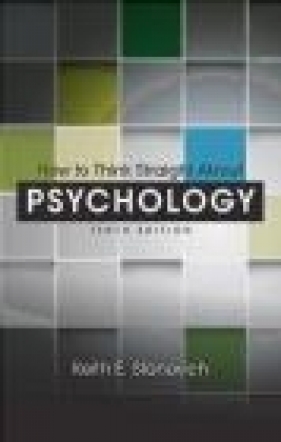234
Książki
Pearson
How to Think Straight About Psychology
Wydawnictwo:
Pearson
Oprawa: Miękka
Opis
Teaching students to become better consumers of psychological research. Keith Stanovich's widely used and highly acclaimed book presents a short introduction to the critical thinking skills that will help students to better understand the subject matter of psychology. How to Think Straight about Psychology, 10e helps students recognize pseudoscience and be able to distinguish it from true psychological research, aiding students to become more discriminating consumers of psychological information. Learning Goals Upon completing this book, readers should be able to: * Evaluate psychological claims they encounter in the general media. * Distinguish between pseudoscience and true psychological research. * Apply psychological knowledge to better understand events in the world around them.In this Section: 1. Brief Table of Contents 2. Full Table of Contents 1. BRIEF TABLE OF CONTENTS: Chapter 1: Psychology Is Alive and Well (and Doing Fine Among the Sciences) Chapter 2: Falsifiability: How to Foil Little Green Men in the Hand Chapter 3: Operationism and Essentialism: "But, Doctor, What Does It Really Mean?" Chapter 4: Testimonials and Case Study Evidence: Placebo Effects and the Amazing Chapter 5: Correlation and Causation: Birth Control by the Toaster Method Chapter 6: Getting Things Under Control: The Case of Clever Hans Chapter 7: "But It's Not Real Life!": The "Artificiality" Criticism and Psychology Chapter 8: Avoiding the Einstein Syndrome: The Importance of Converging Chapter 9: The Misguided Search for the "Magic Bullet": The Issue of Multiple Chapter 10: The Achilles' Heel of Human Cognition: Probabilistic Reasoning Chapter 11: The Role of Chance in Psychology Chapter 12: The Rodney Dangerfield of the Sciences 2. FULL TABLE OF CONTENTS: Preface Chapter 1: Psychology Is Alive and Well (and Doing Fine Among the Sciences) The Freud Problem The Diversity of Modern Psychology Implications of Diversity Unity in Science What, Then, Is Science? Systematic Empiricism Publicly Verifiable Knowledge: Replication and Peer Review Empirically Solvable Problems: Scientists' Search for Testable Theories Psychology and Folk Wisdom: The Problem with "Common Sense" Psychology as a Young Science Summary Chapter 2: Falsifiability: How to Foil Little Green Men in the Hand Theories and the Falsifiability Criterion The Theory of Knocking Rhythms Freud and Falsifiability The Little Green Men Not All Confirmations Are Equal Falsifiability and Folk Wisdom The Freedom to Admit a Mistake Thoughts Are Cheap Errors in Science: Getting Closer to the Truth Summary Chapter 3: Operationism and Essentialism: "But, Doctor, What Does It Really Mean?" Why Scientists Are Not Essentialists Essentialists Like to Argue About the Meaning of Words Operationists Link Concepts to Observable Events Reliability and Validity Direct and Indirect Operational Definitions Scientific Concepts Evolve Operational Definitions in Psychology Operationism as a Humanizing Force Essentialist Questions and the Misunderstanding of Psychology Summary Chapter 4: Testimonials and Case Study Evidence: Placebo Effects and the Amazing Amazing Randi The Place of the Case Study Why Testimonials Are Worthless: Placebo Effects The "Vividness" Problem The Overwhelming Impact of the Single Case The Amazing Randi: Fighting Fire with Fire Testimonials Open the Door to Pseudoscience Summary Chapter 5: Correlation and Causation: Birth Control by the Toaster Method The Third-Variable Problem: Goldberger and Pellagra Why Goldberger's Evidence Was Better The Directionality Problem Selection Bias Summary Chapter 6: Getting Things Under Control: The Case of Clever Hans Snow and Cholera Comparison, Control, and Manipulation Random Assignment in Conjunction with Manipulation Defines the True Experiment The Importance of Control Groups The Case of Clever Hans, the Wonder Horse Clever Hans in the 1990s Prying Variables Apart: Special Conditions Intuitive Physics Intuitive Psychology Summary Chapter 7: "But It's Not Real Life!": The "Artificiality" Criticism and Psychology Why Natural Isn't Always Necessary The "Random Sample" Confusion The Random Assignment Versus Random Sample Distinction Theory-Driven Research Versus Direct Applications Applications of Psychological Theory The "College Sophomore" Problem The Real-Life and College Sophomore Problems in Perspective Summary Chapter 8: Avoiding the Einstein Syndrome: The Importance of Converging Evidence The Connectivity Principle A Consumer's Rule: Beware of Violations of Connectivity The "Great-Leap" Model Versus the Gradual-Synthesis Model Converging Evidence: Progress Despite Flaws Converging Evidence in Psychology Scientific Consensus Methods and the Convergence Principle The Progression to More Powerful Methods A Counsel Against Despair Summary Chapter 9: The Misguided Search for the "Magic Bullet": The Issue of Multiple The Concept of Interaction The Temptation of the Single-Cause Explanation Summary Chapter 10: The Achilles' Heel of Human Cognition: Probabilistic Reasoning "Person-Who" Statistics Probabilistic Reasoning and the Misunderstanding of Psychology Psychological Research on Probabilistic Reasoning Insufficient Use of Probabilistic Information Failure to Use Sample Size Information The Gambler's Fallacy A Further Word About Statistics and Probability Summary Chapter 11: The Role of Chance in Psychology The Tendency to Try to Explain Chance Events Explaining Chance: Illusory Correlation and the Illusion of Control Chance and Psychology Coincidence Personal Coincidences Accepting Error in Order to Reduce Error: Clinical versus Actuarial Prediction Summary Chapter 12: The Rodney Dangerfield of the Sciences Psychology's Image Problem Psychology and Parapsychology The Self-Help Literature Recipe Knowledge Psychology and Other Disciplines Our Own Worst Enemies Isn't Everyone a Psychologist? Implicit Theories of Behavior The Source of Resistance to Scientific Psychology The Final Word References Name Index Subject Index
Szczegóły
Rok wydania
2012
Oprawa
Miękka
Ilość stron
256
ISBN
9780205914128
Rodzaj
Książka
EAN
9780205914128
Kraj produkcji
PL
Producent
GPSR Pearson Central Europe Sp. z o.o.

Dodałeś produkt do koszyka

How to Think Straight About Psychology
234,00 zł

Recenzje